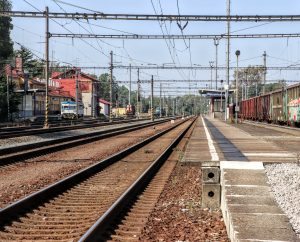 The Czech railway infrastructure manager, SZ, has launched the reconstruction works for the Detmarovice-Karvina railway line which ensures the Czech-Polish rail connection. The project is performed by a the Dětmarovice Company, a consortium comprising Strabag Rail and OHL ŽS.
The Czech railway infrastructure manager, SZ, has launched the reconstruction works for the Detmarovice-Karvina railway line which ensures the Czech-Polish rail connection. The project is performed by a the Dětmarovice Company, a consortium comprising Strabag Rail and OHL ŽS.
Under the project, 10.8 km of track will be reconstructed. In addition to the double-track electrified section of the transit railway corridor from Dětmarovice to the state border with Poland via Petrovice u Karviné, a single-track connection between the Závada and Koukolná branches will also be renovated, allowing trains to run directly from Poland to Karviná, in Moravian-Silesian Region of the Czech Republic.
The project also involves the rehabilitation of the superstructure, while the selected rail bridges will be reconstructed to fulfill the required parameters. One of the concrete benefits of these adjustments will be the elimination of the speed limit at the Petrovice u Karviné station. Modern security equipment will be installed on the entire section, including at the stations.
At the Dětmarovice and Petrovice u Karviné railway stations and at the Závada stop, the platforms will be reconstructed to provide passengers barrier-free access. They will be reroofed and will have modern furniture. Passengers will benefit a new information and orientation system.
Six railway crossings on the rail section will be reconstructed, while the other ones will be equipped with modern security systems.
The traction system will be reconstructed with new traction line to be installed. The traction power at in Petrovice u Karviné station will also undergo modernisation. All modifications will respect the planned transition to a single AC power system.
The Czech-Polish rail connection project which includes the Dětmarovice via Petrovice to Karviná railway link is one of the firsts projects funded under the CEF Blending call in the Czech Republic.
CZK 3 billion (EUR 111 million) is the value of the project which will remove the bottlenecks along the line. The project will be co-financed by the European Union under the CEF Blending call with up to 20% of eligible implementation costs and will be financed from an EIB loan with up to 50% of the total investment costs. The national funding will be provided by the State Fund for Transport Infrastructure.
Share on:



